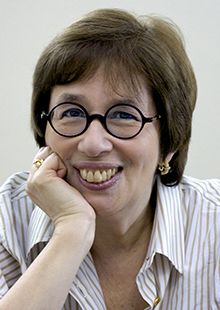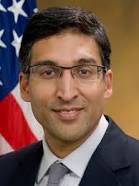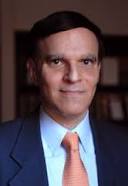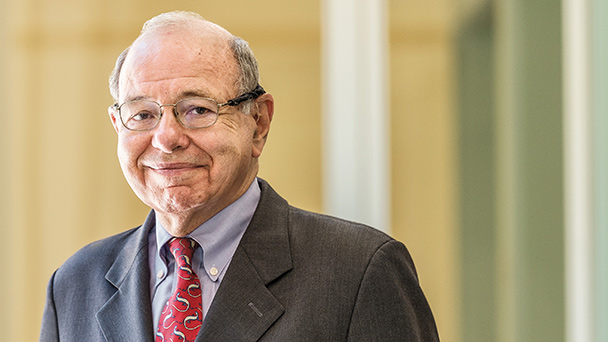2016-2017 Dunn Lecturers
 Jeffrey L. Fisher
Jeffrey L. Fisher
Jeffrey L. Fisher is a Professor of Law and Co-Director of the Supreme Court Litigation Clinic at Stanford Law School. A leading authority on Supreme Court practice and nationally recognized expert on criminal procedure, his work at the law school revolves around handling cases in the U.S. Supreme Court. He has argued 28 cases in the Court, on issues ranging from criminal justice to maritime law to preemption.
Professor Fisher’s successes include the landmark cases of Crawford v. Washington and Melendez-Diaz v. Massachusetts, in which he persuaded the Court to adopt a new approach to the Constitution’s Confrontation Clause; Riley v. California, in which the Court for the first time applied the Fourth Amendment’s protections against unreasonable searches to digital information on smart phones; Blakely v. Washington, in which the Court held that the Sixth Amendment right to a jury trial applies to sentencing guidelines; and Kennedy v. Louisiana, in which the Court held that the Eighth Amendment prohibits states from imposing capital punishment for crimes against individuals that do not result in death. Professor Fisher was also co-counsel for the plaintiffs in Obergefell v. Hodges, in which the Court held that the Fourteenth Amendment guarantees same-sex couples a right to marry. In 2006, The National Law Journal named Professor Fisher one of the 100 most influential lawyers in America—the youngest person on the list.
In addition to his teaching and practice concerning the Supreme Court, Professor Fisher has published numerous articles on various criminal and constitutional issues, and he currently is writing a treatise on the Confrontation Clause. Before joining the Stanford faculty, Professor Fisher co-chaired the appellate practice group of Davis Wright Tremaine. He clerked for U.S. Supreme Court Justice John Paul Stevens and Judge Stephen Reinhardt of the U.S. Court of Appeals for the Ninth Circuit.

Jack Goldsmith
Jack Goldsmith is Henry L. Shattuck Professor of Law at Harvard University. He is the author, most recently, of The Terror Presidency: Law and Judgment Inside The Bush Administration (W.W. Norton 2007), as well as of other books and articles on many topics related to terrorism, national security, international law, conflicts of law, and internet law. Before coming to Harvard, Goldsmith served as Assistant Attorney General, Office of Legal Counsel, from October 2003 through July 2004, and Special Counsel to the General Counsel to the Department of Defense from September 2002 through June 2003. Goldsmith taught at the University of Chicago Law School from 1997-2002, and at the University of Virginia Law School from 1994-1997. He holds a J.D. from Yale Law School, a B.A. and M.A. from Oxford University, and a B.A. from Washington & Lee University. He clerked for Supreme Court Justice Anthony M. Kennedy, Court of Appeals Judge J. Harvie Wilkinson, and Judge George Aldrich on the Iran-U.S. Claims Tribunal.

Linda Greenhouse
Linda Greenhouse is the Knight Distinguished Journalist in Residence and Joseph Goldstein Lecturer in Law at Yale Law School. She covered the Supreme Court for The New York Times between 1978 and 2008 and writes a biweekly op-ed column on law as a contributing columnist. Ms. Greenhouse received several major journalism awards during her 40-year career at the Times, including the Pulitzer Prize (1998) and the Goldsmith Career Award for Excellence in Journalism from Harvard University’s Kennedy School (2004). In 2002, the American Political Science Association gave her its Carey McWilliams Award for “a major journalistic contribution to our understanding of politics.” Her books include a biography of Justice Harry A. Blackmun, Becoming Justice Blackmun; Before Roe v. Wade: Voices That Shaped the Abortion Debate Before the Supreme Court's Ruling (with Reva B. Siegel); and The U.S. Supreme Court, A Very Short Introduction, published by Oxford University Press in 2012. A new book, The Burger Court and the Rise of the Judicial Right, with Michael J. Graetz, will be published in 2016. Ms. Greenhouse is a fellow of the American Academy of Arts and Sciences, where she serves on the council, and is one of two non-lawyer honorary members elected to the American Law Institute, which in 2002 awarded her its Henry J. Friendly Medal. She is a vice president of the Council of the American Philosophical Society, which in 2005 awarded her its Henry Allen Moe Prize for writing in the humanities and jurisprudence. She has been awarded eleven honorary degrees. She is a 1968 graduate of Radcliffe College (Harvard), where she was elected to Phi Beta Kappa, and she currently serves on the Phi Beta Kappa national senate. She earned a Master of Studies in Law degree from Yale Law School (1978), which she attended on a Ford Foundation fellowship. She is married to Eugene R. Fidell, Florence Rogatz Lecturer in Law at Yale. Their daughter, Hannah, is a filmmaker in Los Angeles.

Dan Kahan
Dan Kahan is the Elizabeth K. Dollard Professor of Law and Professor of Psychology at Yale Law School. In addition to risk perception, his areas of research include criminal law and evidence. Prior to coming to Yale in 1999, Professor Kahan was on the faculty of the University of Chicago Law School. He also served as a law clerk to Justice Thurgood Marshall of the U.S. Supreme Court (1990-91) and to Judge Harry Edwards of the United States Court of Appeals for the D.C. Circuit (1989-90). He received his B.A. from Middlebury College and his J.D. from Harvard University.

Neal Katyal
Neal Katyal, the former Acting Solicitor General of the United States, focuses on appellate and complex litigation. He has extensive experience in matters of patent, securities, criminal, employment, and constitutional law. Neal has orally argued 28 cases before the Supreme Court of the United States, with 26 of them in the last seven years. At the age of 46, he has already argued more cases in U.S. history than has any racial minority attorney with the exception of Thurgood Marshall.
Prior to joining Hogan Lovells, Neal served as Acting Solicitor General of the United States, where he argued several major Supreme Court cases involving a variety of issues, such as his successful defense of the constitutionality of the Voting Rights Act of 1965, his victorious defense of former Attorney General John Ashcroft for alleged abuses in the war on terror, his unanimous victory against 8 states who sued the nation's leading power plants for contributing to global warming, and a variety of other matters. As Acting Solicitor General, Neal was responsible for representing the federal government of the United States in all appellate matters before the U.S. Supreme Court and the Courts of Appeals throughout the nation. He served as Counsel of Record hundreds of times in the U.S. Supreme Court. He was also the only head of the Solicitor General's office to argue a case in the U.S. Court of Appeals for the Federal Circuit, on the important question of whether certain aspects of the human genome were patentable.
Neal has also served as a law professor for nearly two decades at Georgetown University Law Center, where he was one of the youngest professors to have received tenure and a chaired professorship in the university's history. He has also served as a visiting professor at both Harvard and Yale Law Schools.
After graduating from Yale Law School, Neal clerked for The Honorable Guido Calabresi of the U.S. Court of Appeals for the Second Circuit as well as for The Honorable Justice Stephen G. Breyer of the U.S. Supreme Court. He also served in the Deputy Attorney General's Office at the Justice Department as National Security Advisor and as Special Assistant to the Deputy Attorney General during 1998-1999. Neal has published dozens of scholarly articles in law journals, as well as many op-ed articles in such publications as the New York Times and the Washington Post, and has testified numerous times before various committees of both the U.S. House of Representatives and the U.S. Senate.
Neal is the recipient of the very highest award given to a civilian by the U.S. Department of Justice, the Edmund Randolph Award, which the Attorney General presented to him in 2011. The Chief Justice of the United States appointed him in 2011 (and again in 2014) to the Advisory Committee on Federal Appellate Rules. Additionally, he was named as One of the 40 Most Influential Lawyers of the Last Decade Nationwide by National Law Journal (2010); One of the 90 Greatest Washington Lawyers Over the Last 30 Years by Legal Times (2008); Lawyer of the Year by Lawyers USA (2006); Runner-Up for Lawyer of the Year by National Law Journal (2006); One of the Top 50 Litigators Nationwide 45 Years Old or Younger by American Lawyer (2007); and one of the top 500 lawyers in the country by LawDragon Magazine for each of the last nine years. He also won the National Law Journal’s pro bono award in 2004.
After graduating from Yale Law School, he worked as a summer associate with Hogan Lovells' legacy law firm, Hogan & Hartson.

Robert Katzmann
Is Chief Judge of the United States Court of Appeals for the Second Circuit. He became Chief Judge on September 1, 2013. A lawyer and a political scientist by training, Judge Katzmann received his A.B. summa cum laude in 1973 from Columbia University, A.M. and Ph.D degrees in government in 1976 and 1978 from Harvard University, and a J.D. in 1980 from Yale Law School, where he was an Article and Book Review Editor of the Yale Law Journal. After clerking on the U.S. Court of Appeals for the First Circuit for Judge Hugh H. Bownes, he joined the Brookings Institution Governmental Studies Program, where from 1981–99, he was a research associate, senior fellow, visiting fellow, and acting program director. Katzmann was nominated by President Bill Clinton to his appeals court judgeship on March 8, 1999.

Scott Keller
Scott Keller is the Solicitor General of Texas. He attended law school at the University of Texas, Austin, graduating with highest honors. Keller clerked for Chief Judge Alex Kozinski of the U.S. Court of Appeals for the Ninth Circuit, 2007-08 and for Justice Anthony Kennedy of the United States Supreme Court during the 2009 Term. He was also a Bristow Fellow in the Office of the U.S. Solicitor General at the U.S. Department of Justice in 2008-09. After a little more than two years in private practice, in 2012, Keller was tapped to be the chief counsel for then-newly elected Sen. Ted Cruz, former Texas solicitor general. He then took the office of Solicitor General of Texas in January of 2015.

Burt Neuborne
Burt Neuborne is the Norman Dorsen Professor of Civil Liberties and founding Legal Director of the Brennan Center for Justice at NYU Law School. For more than 50 years, he has been one of the nation's foremost civil liberties lawyers, serving as National Legal Director of the ACLU from 1981-86, Special Counsel to the NOW Legal Defense and Education Fund from 1990-1996, and as a member of the New York City Human Rights Commission from 1988-1992. He has argued numerous Supreme Court cases, and has litigated literally hundreds of important constitutional cases in the state and federal courts. He challenged the constitutionality of the Vietnam War, pioneered the flag burning cases, worked on the Pentagon Papers case, worked with Justice Ruth Bader Ginsburg when she headed the ACLU Women's Rights Project, anchored the ACLU's legal program during the Reagan years, and defended the Legal Services program against unconstitutional attacks. From 1995 to 2007, he directed the legal program of the Brennan Center, focusing on efforts to reinforce American democracy and secure campaign finance reform. The Brennan Center was established at NYU in 1994 to honor Justice William Brennan, Jr.’s monumental contribution to American Law.
At the same time, Professor Neuborne has forged a national reputation as a constitutional scholar and teacher. In 1990, he was the recipient of the University-wide Distinguished Teacher Award at New York University for his work in teaching Civil Procedure, Evidence, Federal Courts and Constitutional Law. He is the author of four books and over 20 law review articles on diverse areas of constitutional law and procedure. Among his best known scholarly works is the two-volume Political and Civil Rights in the United States, which he co-authored with NYU colleagues Norman Dorsen and Sylvia Law and the Deputy Solicitor General of the United States, Paul Bender. His 1992 lectures on American law at Universitat Pompeu Fabra in Barcelona have been translated and published in Spanish. In 2001, in recognition of his scholarship and his work in the courts, Professor Neuborne was elected to membership in the American Academy of Arts and Sciences. In 2012, Professor Neuborne delivered nine Jay Iselin memorial lectures at Cooper Union on the American constitution. His most recent book is Madison's Music: On Reading the First Amendment." (The New Press, 2015)
In 1996, Professor Neuborne appeared as Jerry Falwell's lawyer in Milos Forman's The People v. Larry Flynt. He appeared on Court TV as the principal commentator in the trial of O.J. Simpson.
Since 1996 Professor Neuborne has served as a principal counsel in a series of lawsuits seeking to recover property unjustly taken from Holocaust victims by Swiss banks and German corporations during the Nazi era. The litigation has succeeded in assembling more than $7.5 billion for distribution to 450,000 Holocaust victims and their families throughout the world. Professor Neuborne was appointed by the Court to oversee the $1.25 Swiss bank settlement, and was appointed by the United States to serve on the Board of Trustees of the German Foundation “Remembrance, Responsibility and Future,” established to distribute the $5.2 billion settlement in the German slave labor litigation.
Professor Neuborne is married to Helen Redleaf Neuborne.